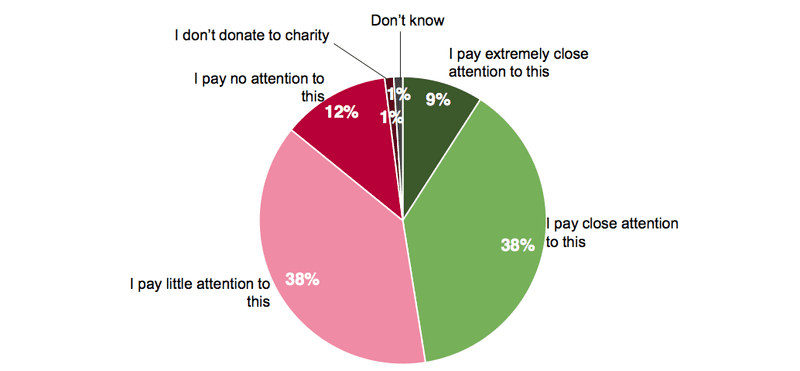Why don't all donors care about impact?
A new report on donor attitudes has just been published by Ipsos Mori. Undertaken on behalf of New Philanthropy Capital, the survey looks at issues of trust, general levels of satisfaction, thoughts on CEO salaries and the importance of impact.
It was this final area that caught my eye. As part of the survey, they asked "How much attention, if any, do you pay to evidence that the organisation is having an impact when you give to charity?".
I was surprised to read that only 9% of the respondents said they paid extremely close attention to impact whereas 50% didn't seem to care that much about how charities use their donations at all.

So maybe we should put less effort into feeding back and use the money elsewhere?
I think that would be a mistake. In my experience, when you show donors how their donation makes a difference, levels of income, loyalty and satisfaction all go shooting up. Supporters also regularly mention feedback as being valued in research. So why does this study suggest so few of them care about what their donations will achieve?
If we look at the data tables, it gives us a few clues.
Interest in impact increases with affluence – from 38% of people in socio-economic groups D and E to 56% amongst ABs. It also increases with age – from just 41% for those aged 18-34 growing to 55% for people aged 55 and over.
It appears that if you are rich in both time and money you are more likely to care about impact.
And that's the point. I'd suggest that what we are seeing here is a distinction between those donors who give small, ad hoc gifts and those who give larger, considered ones.
One wealthy donor summed up this phenomenon quite neatly in a Bluefrog research study a few years back when they compared the difference between giving a 'tit bit' gift and a substantial one...
“I would rather give to a sort of project where you can see the path instead of tit bit amounts, like when they buy a Christmas dinner or a vaccine. I do them all, it’s fine, I know it’s irrational but in my mind I prefer to do one big one, because then I can think about it if I want to."
It's an important point to remember. Small gifts of £2 or £3 don't matter that much simply because the amount is so small. As a result, feedback isn't seen to be that important. But when it comes to larger gifts, the reverse is true. That's when you'd like to know that you made the right decision when you decided to give.
Which raises an interesting question. Just 9% of the population undertakes two-thirds of charitable activity in the UK. How are we going to increase the size of this charitable core, if the vast majority of donors who give smaller sums have no real interest in finding out more about the work of the charities that they support?
Tags In
Related Posts
4 Comments
Comments are closed.
The Essentials

Crack the Code to Regular Giving: Insights, Strategies, and a Special Giveaway!

‘Tis Halloween. Keep to the light and beware the Four Fundraisers of the Apocalypse!

Why do people give? The Donor Participation Project with Louis Diez.

A guide to fundraising on the back of a postcard

What does the latest research tell us about the state of fundraising?






I think use of the words “evidence” and “impact” in the survey question really had an “impact” on the answer. It’s meaningless jargon. If they were asked “Do you care if your donation is really used to help the people you intended to help?”.. I think the answers would have been different.
Using our current buzzwords on donors is never a good idea. What they care least about is jargon.
Hi Denisa, You make a great point. However, do we really think that people care as much about what £3 can achieve as £1,000? We know that click through rates on mobile feedback texts are tiny – under 1%. Feedback is a few seconds away but people aren’t interested.
I think gift size is very important in this respect. I think it might even be worth me breaking open the Bluefrog treasury and asking the question in relation to a couple of gift prompts.
Watch this space!
Mark: So then is your core takeaway that if the majority of your fundraising comes from small gifts, this research is spot on, but if you have a much more diversified income stream, take it with a grain of salt?
Hi Jono. Pretty much. If you have an approach that only asks for very low value gifts (particularly through interruption techniques) you are likely to have a low level of interest in feedback. It obviously can be grown, but don’t expect people to be furiously clicking on a link in a text to find out what a gift is achieved.
Donors who have given higher value gifts will tend to have much more interest in finding out what their money has been used for. They may not demand feedback as few will have particularly high expectations of what charities will share with them, but when provided in the right format it can significantly boost loyalty.
Thanks for commenting
Mark